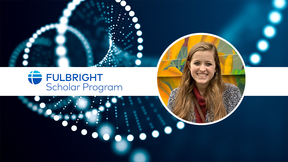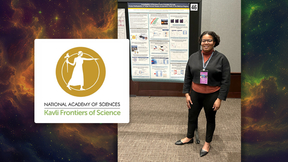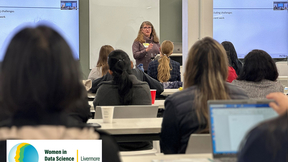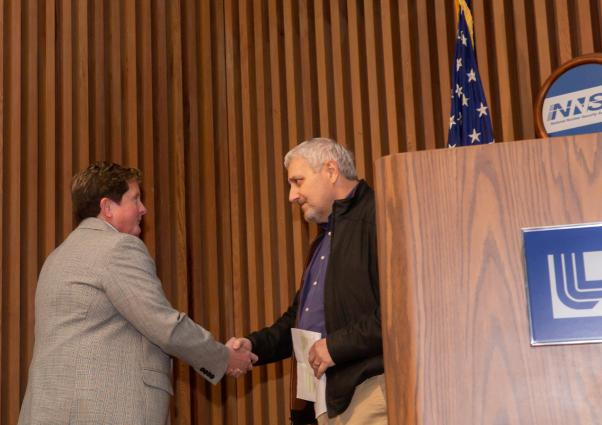A life in leadership: Bauer to depart after guiding Lab through multi-layered challenges
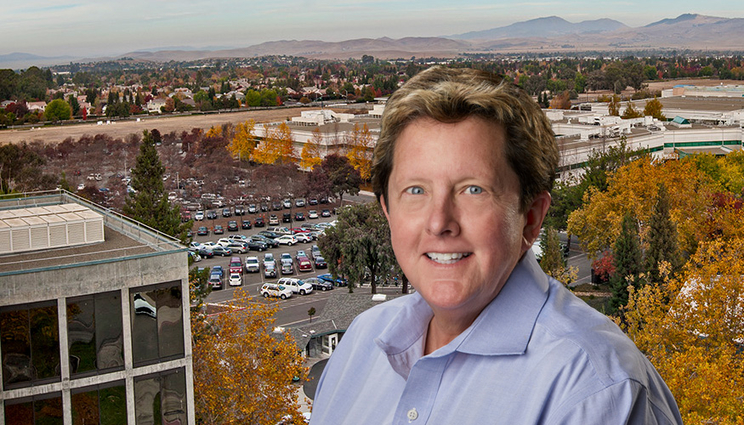 (Download Image)
(Download Image)
During her tenure as deputy director of Lawrence Livermore National Laboratory, Linda Bauer helped lead LLNL through multiple challenges, including the COVID-19 pandemic, by leaning on her wealth of experience in managing through crises. Bauer, who recently accepted a corporate management position at BWXT, will mark her last day at the Laboratory on Aug. 14.
Following decades in management at National Nuclear Security Administration production sites, Linda Bauer aspired to put her leadership skills to the test in the science and technology side of the nuclear enterprise as Lawrence Livermore National Laboratory’s (LLNL's) deputy director.
Bauer, a self-described “road warrior,” had hoped LLNL would be the capstone to her career, a place to lay down roots until she reached retirement. But soon after arriving in November 2019, the unthinkable occurred — the COVID-19 pandemic — disrupting millions of lives, including Bauer’s, and casting doubts on all best-laid intentions.
“It was very much our hope that the Livermore detail would last for years, but the pandemic put a bit of a stick in that spoke,” Bauer said. “I like to say, ‘We make plans, and God laughs.’”
Bauer arrived in Livermore apart from her wife Sue, who stayed back at the family’s home in Knoxville, Tennessee. For months, she and Lab Director Bill Goldstein worked closely together, becoming a “remarkable, chemically balanced twosome” in Bauer’s words, as she familiarized herself with the Lab’s day-to-day operations. She was still settling in when COVID-19 began encasing the globe in early 2020.
Eager to put her skills to the test at a national laboratory, Bauer began her role as deputy director at LLNL in November 2019, where she focused on the Lab’s day-to-day operations and worked closely with then-Lab Director Bill Goldstein to ensure employees had what they needed to succeed.
With no ready-made playbook for a pandemic, Bauer leaned on her experience managing through crises during a 30-year career that included stops at the Pantex Plant, Savannah River and the Y-12 National Security Complex. Living alone with nowhere to go during the lockdown, Bauer threw herself into the job, working in the office nearly every day.
“It was overwhelming at first,” Bauer said. “We just didn’t know what we didn’t know, so it was extremely complex … The role of the Laboratory just makes you want to bring your ‘A’ game. You just want to deliver for the country and for the work.”
As pandemic conditions eased, Bauer became more comfortable in her role. After Goldstein’s retirement in March 2021, she began working with LLNL’s new director, Kim Budil, to help implement the constantly evolving hybrid workplace. But just when it began to look like Livermore would be a long-term base, life threw her another curveball. Back in Knoxville, Sue suffered a massive heart attack, a total arterial blockage often referred to as a “widow-maker.”
“She survived — I don’t know how, but she did,” Bauer recalled. “It was completely out of the blue. This dramatic shift in her health totally reset how I looked at everything.”
With Sue needing care and support back home, it became clear that staying at LLNL long-term wasn’t an option. Bauer began teleworking from Tennessee in May 2022 and recently accepted a position as vice president of the Technical Services Group (TSG) at BWXT, a supplier of nuclear fuel and components that — along with Lawrence Livermore National Security, LLC parent company Bechtel Corporation — oversees several NNSA production sites. Her last day at the Laboratory is Aug. 14.
The new job will allow her to remain close to family and friends while still staying somewhat connected to the Lab, Bauer said. But the decision was not an easy one.
“I like to believe that some things happen for a reason, and I’ve been blessed in my career that when something has seemed to not be going very well, when you look back a few years later, you’re glad that things went exactly the way they did,” Bauer said. “While I hate for the roil that it puts the Lab through to have to change out a deputy director, I know the Lab is going to be fine. It’s going to continue to go on to do great things and it won’t miss me as much as I’ll miss it.”
From scientist to 'leader of many'
Before landing at LLNL, Bauer spent years as a scientist and leader in nuclear power and nuclear security. Growing up in Indiana — her father was an engineer and mother an educator — Bauer had a strong interest in math and science and entertained notions of becoming an astronomer before looking elsewhere for a career with more favorable odds.
Bauer became a “very happy camper” when she found physics and chemistry. She attended the University of Memphis, earning a bachelor’s degree in chemistry. She went on to Purdue University in Indiana, where she received her master’s degree in health physics. The early 1980s were undergoing a renaissance of interest in nuclear power and nuclear waste management, and Bauer was drawn to nuclear power generation and environmental issues. Among the first group of the Department of Energy’s Office of Civilian Radioactive Waste Management Graduate Fellows, her graduate program at Purdue was completely sponsored by DOE.
There, Bauer studied nuclear reactor design. But a different kind of “black swan” event would alter her life’s course — the 1986 accident at the Chernobyl nuclear power plant. Bauer realized that no new nuclear reactors would be built anytime soon, so she shifted to studying radioactive waste and how radionuclides move through groundwater and soil.
After graduating with a Ph.D. in environmental health physics, Bauer took a job with Westinghouse, which managed DOE’s Savannah River Site in South Carolina. The company had plans to build a new production nuclear reactor and needed an atmospheric modeler, which was not her expertise at the time.
“I kept telling them I don’t do air, I do groundwater,” Bauer said, with a laugh. “They said ‘a fluid’s a fluid,’ so I learned how to do it.”
Bauer was eventually asked to lead a group dedicated to radioactive transport in the environment. She had no formal leadership experience at the time but agreed, setting into motion a snowballing effect that grew to expanded management roles with Westinghouse, BWXT and Bechtel, which operate Y-12 in Oak Ridge, Tennessee and the Savannah River Company.
“It just kept moving,” Bauer said. “It wasn’t a conscious choice that I made to be a leader of many people, it just happened over time, I guess because I let it happen and people saw something in me, like ‘well I think Bauer can do this.’ I kept getting plucked to do more things and I kept saying yes.”
In leadership training, Bauer said she was exposed to the concept of “servant leadership,” a philosophy in which the goal of the leader is to serve, not to secure power. She would embrace the philosophy as her management creed in subsequent years.
“Trying to be that servant leader — to facilitate and keep frustrations down and problem solve, that’s who I try to be,” Bauer said. “I know I didn’t come out of a jar like that. I found that I liked it, and I guess people thought I was good at it. I’ve had a lot of luck and being in the right place at the right time.”
In addition to exploring her passion for teaching as an adjunct professor of nuclear engineering at the University of Cincinnati, Bauer scaled the corporate ladder, becoming senior vice president for Los Alamos Technical Associates (LATA) Inc. and found fulfillment in environmental restoration.
For BWXT, she helped lead efforts in the Depleted Uranium Hexafluoride Conversion Project, turning a uranium and plutonium processing facility near Pittsburgh into a green field, with no post clean-up Nuclear Regulatory Commission restrictions. She followed that project up by managing the massive Portsmouth Environmental Restoration Project for LATA at the Gaseous Diffusion Plant near Cleveland.
“I have a little bit of green in me,” Bauer admitted. “I’m not a warrior in that space, but I like the challenge of trying to get radioactivity to stop moving where it’s not supposed to go. It’s like me against the atoms — or ions, as the case may be. To turn a place that no one can use into something usable, feels very good. I get a tremendous amount of satisfaction from that.”
In 2012, Bauer became vice president of Facilities, Infrastructure and Services at Y-12, where she was responsible for facility management and maintenance. Two years later, she joined Consolidated Nuclear Security LLC, a Bechtel affiliate that manages and operates both Y-12 and the Pantex Plant in Texas. As the company’s vice president of Mission Assurance, she focused on daily operations at the two sites.
During her tenure at LLNL, Bauer worked closely with Lab Director Kim Budil to help implement the constantly evolving hybrid workplace that resulted from the COVID-19 pandemic.
In 2019, LLNL’s then-deputy director Tom Giaconda announced his retirement and Bechtel approached Bauer about taking the job. She leapt at the opportunity to “get on the national lab side of the equation.”
“There’s a saying that all the brains are at the design labs and all the brawn is at the production plants,” Bauer explained. “I saw the Lab as this think tank and wanted to live vicariously through the scientists. I envisioned doing it for 4-5 years, but I don’t think anyone could’ve predicted what happened after I got out there.”
Eager to discover if she could cut it at a national lab, Bauer worked with Goldstein to ensure employees had the support and the tools they needed to succeed. After Goldstein retired, Bauer re-adjusted to working with Budil while the Lab transitioned to an entirely different type of workplace. Amid the many victories, the pandemic hampered Bauer’s ability to perform some key functions, such as fostering face-to-face relationships with external stakeholders, industry and the local community. And if COVID wasn’t enough, wildfires that threatened the Lab, combined with global nuclear instability, added more layers of concern.
“There were many dimensions to the challenges we faced over the last few years,” Bauer said. “COVID was the biggest because it made it hard to do my job the way I like to do it. The deputy director should be out seeing things, meeting people, hearing about what they’re doing and learning the footprint of the Lab; I didn’t get to do a whole bunch of that… It was about really being able to triage so much going on at the same time, being able to stay focused on what’s really important and having great teammates. The Lab is full of bright, collaborative people and they know how to come together when there’s a crisis, and they did.”
Pre-COVID, Bauer would work in Livermore and often fly back to Tennessee for weeks at a time to visit Sue and other family. But as air travel became increasingly difficult under the pandemic, her visits home become more infrequent.
“It takes an amazing partner who can put up with that,” Bauer said. “She was stuck out there; I was working out here. It was a strain, but I’m happy to report we’ve all survived it.”
While circumstances and global events seemed to conspire against a long-term stay at LLNL, Bauer said she is grateful for the opportunity to “run with the national lab team” and leaves grateful for the life lessons.
“I was afraid I’d get left behind and be the slow kid in the class, but I believe I held my own,” Bauer said. “I also learned that I don’t want to be that far away from home anymore.”
Sweet home Tennessee
Back in Knoxville, Bauer and her wife reside near the Tennessee River, where kayaking provides much-needed moments of peace. Bauer enjoys the area’s flora, fall foliage and the nearby Great Smoky Mountains National Park. Their house serves as the “official waypoint” for family and friends, and her many outdoor hobbies, including landscaping, keep her grounded.
As “empty nesters,” Bauer and Sue have two grown daughters with children of their own. The youngest, Taylor, lives near Cincinnati with her son Henry. Elder daughter Morgan lives in Fort Worth, Texas with her husband, three sons and a daughter, who collectively run an animal recovery center that provides children with special needs the opportunity to experience farm life. Bauer’s sister-in-law Cathy lives just minutes away and her sister Karen and her family are just a six-hour drive along Interstate 40 in Memphis.
Bauer’s family is tight-knit, but exhibits a “mean streak,” Bauer joked. Her family members have a penchant for pulling elaborate pranks, with Bauer often the victim.
One year, they filled the yard with “obnoxious” inflatable Christmas decorations. On another Christmas visit home, Bauer left her car at the airport, and returned to find a Christmas tree, complete with battery powered lights, affixed to it “like something out of a 'National Lampoon’s' movie.” Once, Bauer flew home to find the entire first floor of the house full of furniture and they convinced Bauer that daughter Morgan and family were moving in — yet another prank. And on one Fourth of July, the family cable-tied red, white and blue pinwheels all over Bauer’s vehicle until every square inch was covered.
“They’re always trying to punk me,” Bauer said. “I’m not sure what caused them to dream this up (originally), but then it became a war of escalation. We’ve added these new generations and people have married into the family and they’re playing right along. They’re an amazing group of people, thrown together because of a variety of different circumstances, and they’ve all sort of bonded, maybe against me.”
Bauer recently turned 60 but has no plans to retire anytime soon. She looks forward to traveling “guilt-free” and has two quests yet to accomplish: visiting all the national parks (hers) and all the state capitals (Sue’s). While she looks forward to spending more time with her wife and the rest of the Bauer clan, Bauer acknowledged the difficulty of putting Livermore in her rear-view mirror. She is most proud of how she and Lab management navigated COVID-19, and the way they are redefining how senior managers communicated with the workforce.
“When I got there, the communication wasn’t empathetic, it wasn’t compassionate — so I’m proud of how we’re changing that. I’m proud of the relationship I’ve tried to build with my co-workers and that comes from being able to communicate better than the way we were doing. With COVID, we stubbed our toes a lot, but I’ll put the body of work in managing COVID pretty much against anything else.”
Most of all, Bauer said she will miss the people, and the breadth and depth of work at the Lab that ensured that “every day was different.”
“When you do the kind of work that we do you really have all kinds of opportunities — I like that feeling very much, having options about what the next chapter might be,” Bauer said. “It’s not easy to be saying goodbye.”
Contact
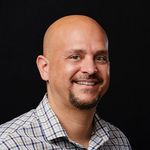 Jeremy Thomas
Jeremy Thomas
[email protected]
(925) 422-5539
Related Links
LLNLTags
CareersFeatured Articles
